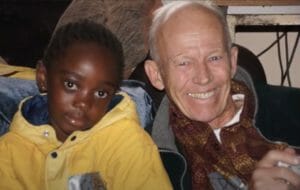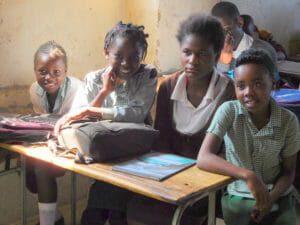Communities Without Borders (CWB) has partnered with Sekelela Community School in Zambia for over a decade, helping to bring education and opportunity to hundreds of vulnerable children. Today, Sekelela stands at a critical turning point — one that will determine whether more than 100 students can continue their education or be forced to stay home again.
This is the story of a resilient school, a dedicated community, and a shared mission to open the doors to learning for every child.
A Decade of Partnership and Growth
Sekelela Community School is CWB’s flagship project in Zambia, managed in partnership with CWB Zambia (CWBZ) and the Zambia Open Community Schools (ZOCS) network that connects community-run schools like Sekelela to the national education system.
When CWB began supporting Sekelela in 2014, the school had just four classrooms and served around 300 students. By 2021, thanks to CWB donors and local collaboration, three additional classrooms were built — expanding capacity and strengthening the school’s reputation for academic success and community leadership.
Today, Sekelela serves nearly 700 students and has one of the strongest academic records in the region. It also boasts an active Parent Community School Committee that works closely with teachers and CWBZ to manage projects, advocate for students, and maintain the school’s growing infrastructure.
The New Challenge: Keeping Students in School
In 2024–2025, Zambia’s Ministry of Education introduced a new national curriculum requiring all students who pass Grade 7 to continue their education in secondary school.
For Sekelela’s students, this change created an unexpected crisis. The nearest secondary school is 21 kilometers (about 13 miles) away (one way), a distance far too dangerous for young students — especially girls — to walk each day. As a result, roughly 100 Sekelela students who completed Grade 7 were forced to stay home this year.
After months of discussion with the District Education Board Secretary and the Ministry of Education, a path forward was approved:
If Sekelela builds a new four-classroom block — including a science lab and a computer lab — the school will officially be recognized as a junior secondary school (Forms 1–2) and allowed to re-enroll its students.
This means CWB and the Sekelela community now have the opportunity to bring those 100 children back to school and ensure that all future students can continue their education safely and close to home.
The Plan: Building Four New Classrooms
The new classroom block will include:
- Four classrooms, including one science and one computer lab
- Teacher offices and secure storage space for science and technology materials
- Facilities designed to meet Ministry of Education standards for junior secondary schools
Planning began in April 2025, and by September, the construction bidding process was complete. Eleven builders submitted bids, and the CWB Board approved $67,000 for construction. With ZOCS serving as the tax-exempt contracting partner and project monitor, the foundation is ready — the only thing missing is the funding.
The goal is to finish construction by January 2026, so that Sekelela can reopen to 8th-grade students.
A Model of Community Leadership
Sekelela continues to thrive not only because of infrastructure support, but also because of its strong leadership and community involvement.
- Teachers and Staff: Two new teachers — a science teacher and an early childhood education teacher — joined the staff this year. All Sekelela teachers currently volunteer as they await government payroll placement, a testament to their dedication.
- Guidance & Counseling: The school’s counseling program supports students with life skills, health education, and emotional well-being. In 2025, no teenage pregnancies were recorded, and only one early marriage case was reported — both major successes in a rural Zambian context.
- Infrastructure Progress: The community recently completed a new bathroom facility and an Early Childhood Education classroom, both funded in part by parents’ contributions.
- Sustainability Efforts: Sekelela’s school garden provides food and a small income to cover teachers’ transportation to training workshops. A small on-campus store also sells basic supplies, using profits to support school operations and teacher travel.
- Community Spirit: CWB and the community recently co-funded new sports jerseys, strengthening school pride and participation in local tournaments.
Why This Moment Matters
Sekelela has come a long way, from four classrooms under trees to a thriving primary school of 700 students. But without this new building, students who complete Grade 7 will again have nowhere to go in 2026.
This project isn’t just about classrooms — it’s about continuity, safety, and hope. It’s about keeping girls in school, reducing dropouts, and ensuring that the dream of education doesn’t end after Grade 7.
With your help, Sekelela can continue its remarkable journey and officially become a junior secondary school, serving generations of students to come.
How You Can Help
💵 Our Goal: Raise $67,000 to build 4 classrooms and send 100 students back to school. 💵
Your donation will fund the construction materials, labor, and equipment needed to make this project a reality — and your impact will last for decades.
Every dollar helps build a future.
Together, we can open the doors to Sekelela’s next chapter — a future where every child has a place to learn, grow, and thrive.







